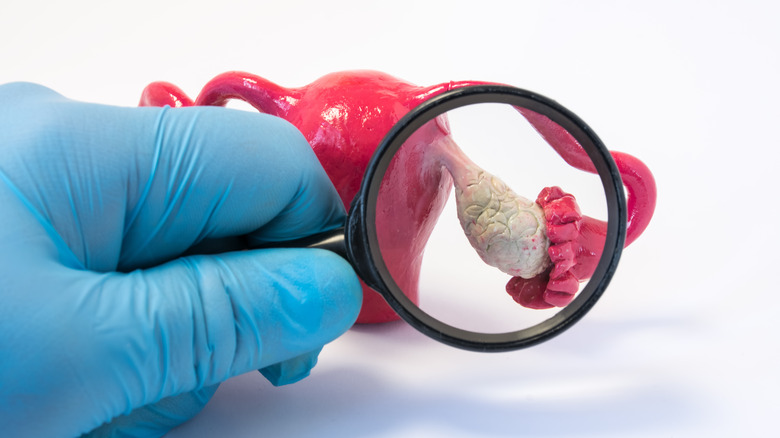Is There A Link Between Ovarian Cysts And Infertility?
Ovarian cysts usually form on or inside the ovaries and appear as fluid-filled sacs (via Cedars-Sinai). They can occur in women of all ages, especially those of reproductive age. In most cases, the cysts are benign (not cancerous) and do not cause any symptoms, explains Healthline. However, various types of ovarian cysts exist — functional cysts are the most common and typically go away on their own within a few months. Other types include endometriomas, which develop from endometrial tissue, and cystadenomas, or cysts that form from cells on the surface of the ovary.
In some cases, ovarian cysts can rupture and cause pain and discomfort. If the cysts are causing severe symptoms, they may need to be surgically removed. According to Healthline, ovarian cysts can also be a sign of a more serious condition, such as ovarian cancer. This means it is important to seek medical attention if you have symptoms, such as persistent pain, bloating, or irregular periods.
Do ovarian cysts cause infertility?
Ovarian cysts can impact fertility in some cases. However, the relationship between ovarian cysts and infertility is complex, and it can vary depending on the type of cyst. Some types of ovarian cysts, such as functional cysts, are benign and typically go away on their own within a few months, says the Cleveland Clinic. These types of cysts usually do not affect fertility, according to the Mayo Clinic. However, other types of ovarian cysts, such as endometriomas and cysts caused by polycystic ovary syndrome, can be more serious and may impact fertility. In some cases, surgery to remove an ovarian cyst can result in damage to the ovary, which can impact fertility, explains Extend Fertility.
Generally speaking, having an ovarian cyst does not necessarily mean that a woman is infertile. Many women with ovarian cysts can conceive and have successful pregnancies. The impact of ovarian cysts on fertility should be evaluated by a doctor individually.
How are ovarian cysts treated?
The treatment for ovarian cysts depends on several factors, including the size and look of the cyst, per the National Health Service (NHS). In many cases, ovarian cysts do not cause any symptoms and do not require treatment. According to the Cleveland Clinic, small functional cysts may go away on their own within a few months. In these cases, you might be monitored with ultrasound scans to ensure that the cyst is shrinking and to check for any changes. If your cyst is caused by endometriosis, you might be prescribed hormonal medications to help shrink the cyst, says the NHS.
If a cyst is large, persistent, or causing pain or discomfort, you may be advised to have surgery to remove the cyst. This can be done via a laparoscopic procedure, says the NHS. This minimally invasive surgical technique involves making small incisions in the abdominal wall and using a camera to complete the procedure, says the Cleveland Clinic.



